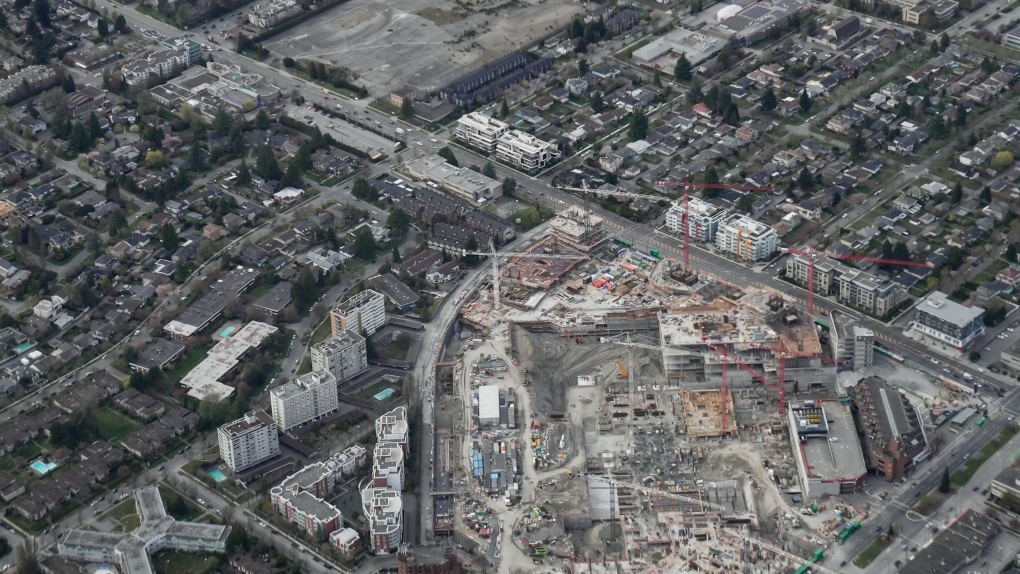Average rent for 1-bedroom apartments dips in Vancouver – but not by much
 Metro Vancouver is seen in an aerial view in Vancouver, on Saturday, April 9, 2022. THE CANADIAN PRESS/Darryl Dyck
Metro Vancouver is seen in an aerial view in Vancouver, on Saturday, April 9, 2022. THE CANADIAN PRESS/Darryl Dyck
The average asking rent for a one-bedroom apartment in Vancouver dipped below $3,000 in August, even as the national average reached a new record high, according to the latest monthly report from Rentals.ca.
The modest month-over-month decline of 0.8 per cent brought Vancouver's average down to $2,988 – though the city remained the most expensive place in Canada for people looking to rent.
Toronto placed second once again, with the average asking price for a one-bedroom reaching $2,620, a 1.1 per cent increase over July.
Nationwide, landlords asked for an average of $2,117 for a one-bedroom last month – which set another record high for the country, according to Rentals.ca. That average represents a 1.8 per cent increase from the previous month, and a 9.6 per cent increase from August 2022.
"Despite rental apartment completions in Canada over the past 12 months reaching their highest level since the 1970s, rent growth has remained exceptionally strong," reads the Rentals.ca report. "This can be attributed to the country’s record-high population growth and sharp deterioration in homeownership affordability."
The data does not represent the average rents tenants are paying across the country, only the price of active listings across the Rentals.ca network. Long-term renters often pay well below market rates, which have been skyrocketing over recent years.
The cheapest and most expensive listings – those that are less than $500 per month or more than $5,000 per month – are removed from the calculations, according to the website.
Earlier this week, the B.C. government announced the maximum allowable rent increase for 2024 has been set at 3.5 per cent – marking the second consecutive hike set below the rate of inflation.
Normally, the province ties the increase to the average rate of the Consumer Price Index from the one-year period ending in July of the previous year.
Landlords are free to increase rent as much as they wish after a tenant moves out or is evicted, however – a situation tenants' advocates believe incentivizes abuse of eviction rules.
CTVNews.ca Top Stories

Joe Biden pardons son Hunter Biden of gun, tax charges, despite promising not to
U.S. President Joe Biden announced Sunday that he pardoned his son Hunter Biden on gun, tax charges, despite previous promises that he would not do so.
Canada Post presents union with 'framework' to reach deal as strike continues
Canada Post has presented the union representing some 55,000 striking postal workers with a framework to reach negotiated agreements, the corporation said.
'Devastating': Missing Surrey, B.C. teen found dead, family says
The family of a missing 18-year-old, who was last seen in Surrey over a month ago, says there has been a tragic end to the search.
The best tips to prepare your car for the winter
Slippery or snow-covered roads, reduced visibility and bitter cold are all conditions that can make driving difficult and even dangerous during cold weather months. CAA spoke with CTV Morning Live this week on some of the best ways you can winterize your car.
PM Trudeau 'surprised' provinces unanimous on accelerated defence spending: Ford
Ontario Premier Doug Ford says his fellow provincial leaders are united in pushing for Canada to meet its NATO defence spending targets ahead of schedule, and that Prime Minister Justin Trudeau was "surprised" to hear it.
Stellantis CEO resigns as carmaker sales continue to slump
Stellantis CEO Carlos Tavares is stepping down after nearly four years in the top spot of the automaker, which owns car brands like Jeep, Citroën and Ram, amid an ongoing struggle with slumping sales.
'Wicked' star Marissa Bode speaks out against 'harmful' ableist comments made about her character
'Wicked' actress Marissa Bode posted a video on TikTok asking for kindness after receiving ableist comments on social media.
Poilievre calls for asylum seeker cap, border plan as U.S. tariff threat looms
Conservative Leader Pierre Poilievre has demanded the federal government present a plan before Parliament to beef up border security as U.S. president-elect Donald Trump threatens to impose stiff tariffs on Canada.
Emergency crews battle large fire at Kitchener, Ont. townhouse complex
Waterloo Regional Police say Kingsway Drive will remain closed as emergency crews continue to battle a large blaze at a townhouse complex.

































